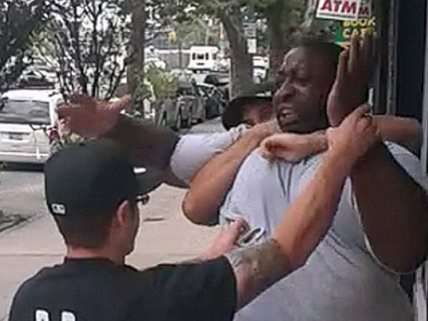Want to Prevent Future Eric Garners? Don't Give Cops Excuses to Bust People.
To reduce violent encounters between police and the public, slash the spiderweb of laws, rules, and regulations.

Only Officer Daniel Pantaleo knows what motivated him to confront and ultimately kill Eric Garner—and what spurred him in previous incidents that drew two civil rights lawsuits during his eight years with the New York Police Department. Maybe he's a racist. Maybe he's a martinet. Maybe he's just an asshole. The fact of the matter is, it's difficult to think of a good reason for killing a man who attracted police attention by breaking up a fight and peddling a few untaxed cigarettes.
There's no doubt that minority communities get more than their fair share of police attention. New York City's notorious "stop and frisk" policy has disproportionately targeted blacks and Hispanics—even though the city concedes that whites are more likely to be found to be carrying guns and drugs. Nationally, young black men are 21 times more likely to be shot dead by police, reports ProPublica.
Unsurprisingly, Reason-Rupe polling finds white Americans are much more likely than blacks and Hispanics to have favorable opinions of police.
But the same can be said of older and more affluent Americans relative to younger ones. That's because race isn't the ultimate determinant of a nasty encounter with law enforcement—that's largely a function of drawing police attention, and there are different ways of doing that, most of which give wealthy senior citizens a pass.

One of the nastier deaths by cop of recent years was the killing of Kelly Thomas, a white, homeless schizophrenic who was beat to death by police in Fullerton, California, after offering little if any resistance to a search. The officers actually went to trial after intense public pressure, but were acquitted.
Drawing police attention, with all of its potential consequences, has become increasingly easy given the proliferation of excuses for cops to roust the public. As Professor Stephen Carter of Yale Law School wrote, citing the work of legal scholar Douglas Husak, "More than 70 percent of American adults have committed a crime that could lead to imprisonment."
In response, Professor David Gray of the University of Maryland School of Law commented:
70 percent seems low to me. Once you factor in illegal drug use, crimes of recklessness (which seldom are detected because no harm accrues), downloading, DUI, failures to report income, and the scores of relatively innocuous offenses that just happen to carry the possibility of jail time in some jurisdictions, I'd be surprised if the percentage wasn't much higher than 70 percent over the course of most adults' lifetimes.
The vast majority of us are lawbreakers, just hoping that law enforcers don't notice. If they do notice, we're dependent on whatever sense of mercy they might possess, and vulnerable to any prejudices and demons that might drive them.
Those demons might be racism—experience suggests they often are. They might be anger issues, which researchers find heighten police perceptions of danger and subsequent reactions. Or the police might actually be encouraged to view the public at large as enemies in need of control and suppression.
It would be nice if that last point weren't so important, but it is. The militarization of policing that finally hit the headlines this year with the eruption in Ferguson after Michael Brown's death isn't so troubling because police departments picked up some armored vehicles and camouflage courtesy of the federal government. The real problem is that they've also adopted an army of occupation mentality to accompany the GI Joe gear. In its recent report on police militarization, the American Civil Liberties Union described police training materials that repeatedly invoke terms like "warrior mindset" and "battlemind," which is defined as "a warrior's inner strength to face fear and adversity during combat."
"Battlemind"? Maybe in Fallujah. But that's a dangerous attitude to bring to encounters with the occasional loosie peddler or homeless guy.
Police departments even inject that adrenaline-fueled, confrontational attitude into their recruitment efforts. That's all too apparent in the much-discussed "Are You Qualified" video produced by the Newport Beach Police Department—just a few miles from where Kelly Thomas was stomped.
To his credit, after public revulsion at a grand jury's failure to indict Pantaleo for killing Eric Garner, New York City Mayor Bill de Blasio said he wants to "retrain" the entire NYPD to reduce officers' reliance on violence in encounters with the public and to (somehow) root out bigotry. If he does nothing more than drop some of that emphasis on "battlemind," that might be beneficial.
But this is the same Mayor de Blasio why says "the law is the law" and insists that police "strictly enforce" the myriad rules and regulations that turn 70 percent (or more) of us into criminals, and create unpleasant encounters between cops and the public. Despite earlier promises, he opposes efforts to further restrict stop-and-frisk targeting of the public by police.
And each of those encounters will always be an opportunity for violence, and for inner prejudices beyond the reach of any seminar to come into play.
Do you really want to reduce the chance of future Eric Garners? Then slash the spiderweb of laws, rules, and regulations that turn the majority of Americans into criminals, and make us all potential targets for the police and whatever inner demons drive them.
